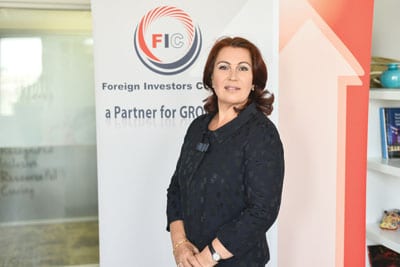The FIC contributes to improving the business climate in Serbia and targets working more efficiently, together with the Government, on the common goal of making Serbia the optimal investment destination, appealing both for new and existing foreign investors
The Foreign Investors Council (FIC) is looking forward to continuing the dialogue with the Serbian government and, through qualitative discussion, speeding up the reform process for the benefit of all stakeholders, says Yana Mikhailova, FIC President and Regional Director of Nestlé Adriatic.
What steps should the government take in order to ensure stable and robust economic growth over the longer term?
– Our expectations are centred on three major areas: acceleration of important structural reforms, better law enforcement, and harmonisation with EU regulations. Let me elaborate on each of them. First, structural reforms make the market more competitive and foster economic growth – that’s why the acceleration of structural reforms is a good sign for the business community in the country and for investors who plan to enter. The privatisation and corporatisation of state-owned enterprises are important steps on that path.
Second, we have seen a few positive moves in the development of the regulatory framework, now there is an urgent need for further progress in alignment of the laws and bylaws, consistent implementation of legislation at the level of all stakeholders and improvement of the efficiency, capacity and capability of governmental structures. As a few examples – the Law on Inspections should be followed up with the fully functioning Coordination Body and the formation of the Council for Risk Analysis. In the tax area, we need better coordination between the Ministry of Finance and Tax Administration and Tax Administration reform. We are looking forward to the quick implementation of the new Law on Land Conversion, which will marenable the introduction of private ownership over land.
Third, there is a gap to be closed in the harmonisation of the Law on Foreign Exchange Operations and the Law on Personal Data Protection with EU standards. We expect the Law on Charges to safeguard us from new para-fiscal charges and the regulation of staff leasing.
What is the role of foreign investments in boosting output, export and employment in the country, and how much are FIC members contributing to these goals?
– Foreign companies bring new investments and jobs, introduce modern technologies, facilitate innovations, and engage local small and medium-sized enterprises in their value chains, integrating them into the global market.
 The FIC contributes by itself to the Serbian economy as it continues to expand, gathering around 130 foreign companies which have invested over €23.5 billion, contributed 18 per cent of GDP in 2013 and which directly employ more than 97,000 people in Serbia.
The FIC contributes by itself to the Serbian economy as it continues to expand, gathering around 130 foreign companies which have invested over €23.5 billion, contributed 18 per cent of GDP in 2013 and which directly employ more than 97,000 people in Serbia.
FIC members promote ethical business conduct and operate in line with solid corporate governance principles, therefore elevating the overall business and investment climate to a new level.
Last, but not least, the FIC is a multicultural and multi-experienced community which, along with 70% of EU members, comprises companies from the U.S.A. to Russia and China, which are starting to invest more in Serbia than they used to. Therefore, the FIC unites a good blend of experience which can help Serbia to progress further and become a stronger market economy.
Does the Government’s subsidies policy play a key role in investors’ decisions to invest in Serbia and stay?
– Subsidies are not a bad thing in and of themselves, but they are a short-term measure which should be introduced for a limited period of time and applied in a very transparent way.
Where are the key challenges for the further development of an enabling environment for investment?
– The key challenge is certainly the better implementation of laws. Clarity of the regulatory framework, consistency of implementation and law enforcement are the key preconditions for legal certainty in Serbia. And if these things are in place, those investors who are already operating in Serbia will become the best promoters of Serbia’s potential.
Government needs to work further in order to transparently improve regulations, strengthen institutional capacity, minimise administrative burdens and provide an effective safeguard to investors
So far, we have witnessed some progress in this area, but the Government needs to work further in order to transparently improve regulations, strengthen institutional capacity, minimise the administrative burden and provide an effective safeguard to investors.
In that respect, it is important that the government continues to have a consistent dialogue with the business community and receives feedback.
How are foreign companies already operating on the market helping the Serbian economy to catch up in terms of productivity, efficiency and advances in technology?
– Foreign companies are bringing innovation, know-how and expertise. FIC members are particularly true promoters of the knowledge-based economy, as they base their business models on contemporary practices and innovation. Additionally, business ethics, clarity of the way they operate, and compliance with the law are areas where FIC members are bringing important further values to the country.
Where should Serbia exert additional institutional efforts in the European integration process?
– The EU accession process will make the Serbian market more competitive because by achieving a functioning market economy it will secure the same framework for everyone and this will boost growth. Furthermore, when you are improving the internal market you make it more competitive within the EU landscape too, which means that Serbia will gain the capacity to cope with competition and market forces within the EU. To achieve that, Serbia will need to execute a widespread set of structural and economic reforms, which call for strong political consensus and public support.
How do you provide support to Serbia’s EU accession negotiation process?
– The FIC is instrumental in the process, as it has a deep understanding of both the markets of the EU and of Serbia, and can help the smooth transition of the Serbian market into the EU. How? First of all by providing feedback, but also by helping to shape the regulatory framework. We already took important and tangible steps in that way by organising two official visits to Brussels in October 2014 and September 2015. The third one is planned for October 2016.
Viewed in general terms, what are the main characteristics of the business climate in Serbia at present?
– There are evident positive changes in specific policy areas, such as inspections and illicit trade, the adoption of the Law on Inspection Oversight; acceleration of the procedure for issuing construction permits; and changes of the Law on the Employment of Foreigners that allow self-employment, exercising unemployment rights and harmonisation of national legislation with the EU Acquis.
 However, the end of last year brought changes to the previously established good practice of consultations with the private sector regarding new laws, as some were adopted without public insight or debate. An example of this is the new Law on Chambers, which introduces mandatory membership and a fee in the Serbian Chamber of Commerce (SCC) for all businesses as of January 2017. The same happened with a number of tax laws. We understand the purpose of creating the SCC, though we question whether SCC membership should be obligatory – considering that most of our members see the mandatory fee as a para-fiscal charge.
However, the end of last year brought changes to the previously established good practice of consultations with the private sector regarding new laws, as some were adopted without public insight or debate. An example of this is the new Law on Chambers, which introduces mandatory membership and a fee in the Serbian Chamber of Commerce (SCC) for all businesses as of January 2017. The same happened with a number of tax laws. We understand the purpose of creating the SCC, though we question whether SCC membership should be obligatory – considering that most of our members see the mandatory fee as a para-fiscal charge.
In which areas could be strengthened dialogue between the government and the business community contribute to taking a qualitative step forward?
– The FIC contributes to the improvement of the business climate in Serbia and targets working more efficiently together with the government on the common goal of making Serbia the optimal investment destination, appealing both for new and existing foreign investors, and to be a good ambassador of Serbia abroad.
The FIC contributes to the improvement of the business climate in Serbia and targets working more efficiently together with the government on the common goal of making Serbia the optimal investment destination
In order to do so, we propose a set of taskforce topics which correlate to the PM’s expose in the National Assembly, such as fighting unemployment through the creation of a predictable tax environment, stimulating agriculture by introducing EU standards in food safety, fighting the grey economy by cutting unfair competition and introducing strong inspection system, creating a capable, open-minded and well-educated workforce by forging links between schools/universities and businesses, sharing FIC members’ knowledge in creating a sustainable and efficient health sector and promoting Serbia’s interests in Brussels using the leverage of our members (75% from the EU) to make prompt and steady progress.
In this context, how do you see the long-term contribution of the FIC to these processes?
– We believe that the joint task force of the Government and FIC representatives, which was proposed by the prime minister at the White Book event in 2015, would be an appropriate mechanism to ensure optimal results in the reform processes, and at the same time serve to promote good collaboration and openness in dialogue between the Serbian government and foreign investors. In our view, the task force should be comprised of the highest government representatives and members of the FIC Board of Directors. Through regular meetings, this body will recognise the progress made and set new goals to be achieved.
In terms of FIC collaboration with the Government, what is in your view of the FIC’s major strengths and which practices in the period to date have proven to be the most effective for making tangible improvements to the business and investment environment?
– More than a decade after its establishment, we can say that all Serbian Governments were receptive and open to hearing foreign investors’ positions on the business climate. We welcome all of the opportunities so far given to be part of consultations about the drafting of important laws and regulatory changes.
Each year, as our White Book testifies, brings progress in mutual cooperation and the public-private dialogue.
The FIC’s major strength is that it solely promotes views and suggestions which are the common denominator of a majority of its members. That is the source of the association’s strength
The FIC’s major strength is that it solely promotes views and suggestions which are the common denominator of a majority of its members. That is the source of the association’s strength, which is not the voice of one company or a group of companies, but the unified voice of more than 100 entities whose operations depend on the development and growth of the entire Serbian market. Through its inter-sector and sector-specific committees, the FIC offers knowledge and expertise in the form of comments of its member companies on new draft legislation and amendments to existing laws and, based on them, specific recommendations are formulated in the best interests of the stakeholders on the market.
Based on a request of our members, we recently formed our ninth committee: Digital and E-Commerce. We are convinced that the FIC can make a considerable contribution to the development of the industries. By the end of the year, we will form the tenth committee.